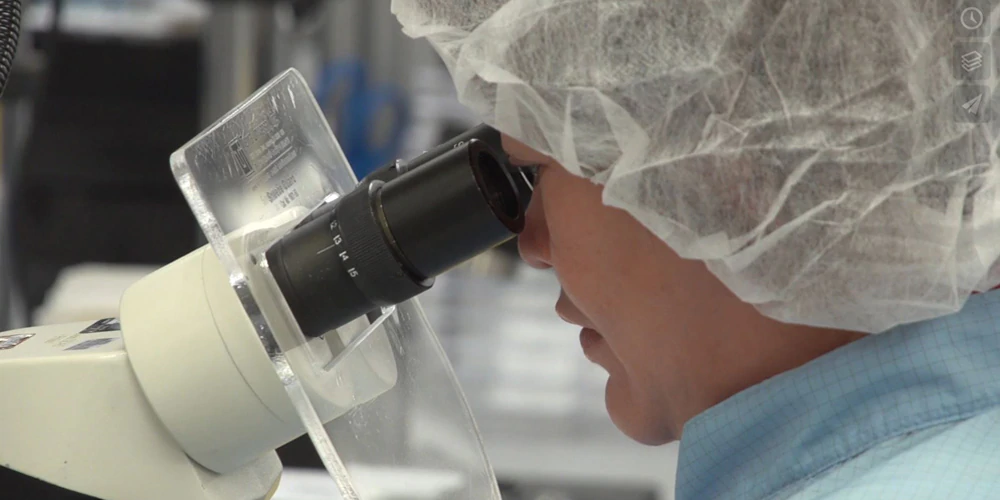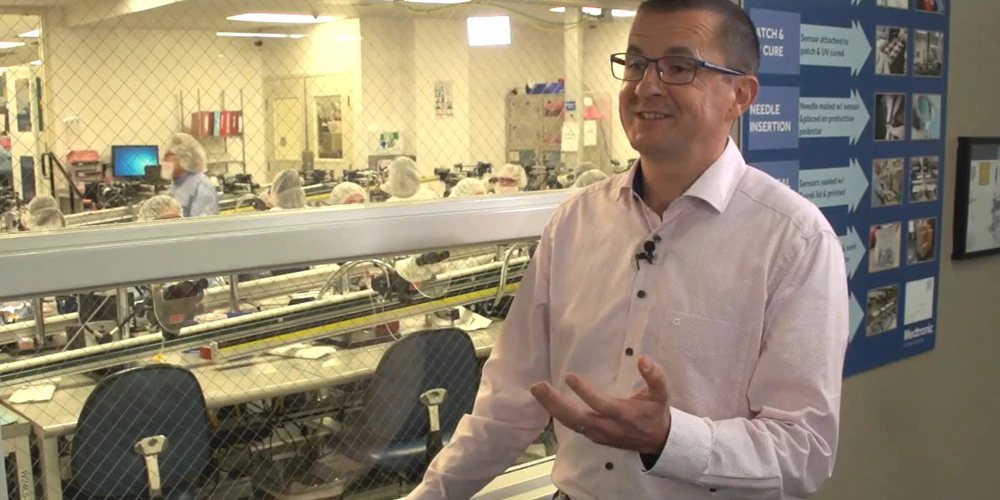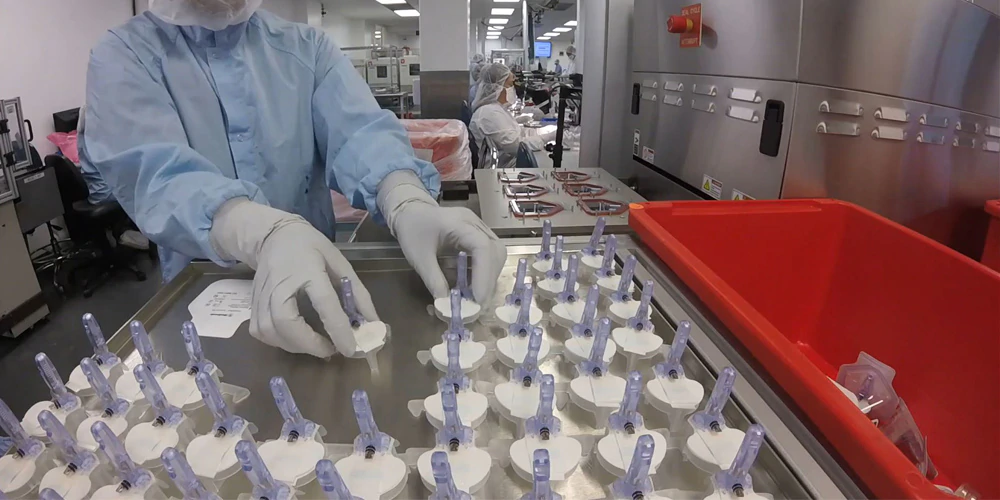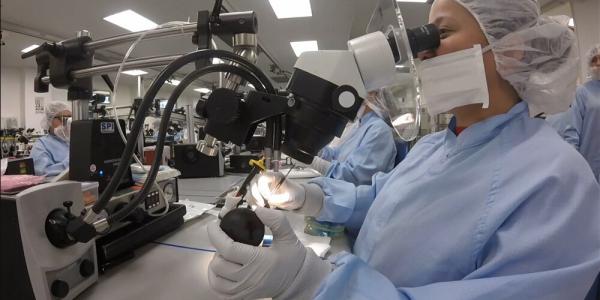Manufacturing Teamwork Leads to Patient Benefit
Business groups team up on production to meet demand for diabetes technology.
May 29, 2018 -- When Patrick Rosset hung up the phone, he asked his wife a question that would impact more than his career.
“What do you think about California?”
He was being asked to move from Switzerland to Los Angeles for an unknown period of time to take on — what some were calling — an impossible task.
“Let’s do it,” she said.
And with that, Patrick, a longtime manufacturing strategy director within the Medtronic cardiovascular group, was off to the U.S.
IN HIGH DEMAND
In Northridge, California, the headquarters of the company’s diabetes business, demand for the MiniMed 670G was at an all-time high. The technology requires a sophisticated sensor that helps control the flow of insulin to the patient, but with an earlier than expected FDA approval, production lines weren’t prepared.
“We couldn’t keep up with the demand,” recalls Leonel Peralta, Vice President of Operations at Medtronic Diabetes. “We needed a capacity improvement plan.”
Help came from an unlikely spot. The team in California reached out to manufacturing experts from the company’s cardiovascular business — including Patrick, living a world away.
Patrick, and a team of a dozen other employees from the cardiovascular team, assessed the issue, and began the process by — of all things — staying silent.
“You have to listen first,” says Patrick. “You can’t arrive at a business you know nothing about and say this what we need to do. You have to be humble before you provide advice and coaching.”
Beyond the core team, engineers, supply chain experts, Human Resources, and Quality leaders from around the business pitched in to help.
You can really make the impossible, possible. The teamwork these two businesses showed really made a difference.
Leonel Peralta, VP Operations, Medtronic Diabetes
PRODUCTION GOES UP — WAY UP
Over the course of the next eight months, the Diabetes Business hired more employees, purchased critical machines, reconfigured operations, and introduced a cell operating system (see COS in action in heart valve manufacturing) meant to streamline production.
“It was a day-to-day race,” says Patrick. “It was a marathon and I’m proud of how this team worked together.”
Production lines improved beyond anyone’s imagination. In three quarters, the team increased production by 700 percent. And leaders say they’re still ramping up.
“You can really make the impossible, possible,” said Peralta. “The teamwork these two businesses showed really made a difference.”
Employees in California credit the cross-business perspective — something, according to leaders, is rarely done within big companies.
“Bringing in people who could see our issue from a different angle was a game changer for us,” said Alex Schredl, manufacturing manager at Medtronic Diabetes. “We worked together and feel like we can tackle the next challenge that comes our way.”
With the company’s Mission focused on alleviating pain, restoring health, and extending life for patients, it leaves little room for business silos or a self-serving approach.
“We are all one Medtronic,” says Patrick. “At the end of the day, it’s about serving the patient.”
IMPORTANT SAFETY INFORMATION
The Medtronic MiniMed 670G system is intended for continuous delivery of basal insulin (at user selectable rates) and administration of insulin boluses (in user selectable amounts) for the management of type 1 diabetes mellitus in persons, fourteen years of age and older, requiring insulin as well as for the continuous monitoring and trending of glucose levels in the fluid under the skin. The MiniMed 670G system includes SmartGuard technology, which can be programmed to automatically adjust delivery of basal insulin based on continuous glucose monitor sensor glucose values, and can suspend delivery of insulin when the sensor glucose value falls below or is predicted to fall below predefined threshold values. The system requires a prescription. The Guardian Sensor (3) glucose values are not intended to be used directly for making therapy adjustments, but rather to provide an indication of when a fingerstick may be required. A confirmatory finger stick test via the CONTOUR®NEXT LINK 2.4 blood glucose meter is required prior to making adjustments to diabetes therapy. All therapy adjustments should be based on measurements obtained using the CONTOUR®NEXT LINK 2.4 blood glucose meter and not on values provided by the Guardian Sensor (3). Always check the pump display to ensure the glucose result shown agrees with the glucose results shown on the CONTOUR®NEXT LINK 2.4 blood glucose meter. Do not calibrate your CGM device or calculate a bolus using a blood glucose meter result taken from an alternative site (palm) or from a control solution test. If a control solution test is out of range, please note that the result may be transmitted to your pump when in the “Always” send mode.
WARNING
Medtronic performed an evaluation of the MiniMed 670G system and determined that it may not be safe for use in children under the age of 7 because of the way that the system is designed and the daily insulin requirements. Therefore this device should not be used in anyone under the age of 7 years old. This device should also not be used in patients who require less than a total daily insulin dose of 8 units per day because the device requires a minimum of 8 units per day to operate safely.
Only use rapid acting U100 insulin with this system. Pump therapy is not recommended for people whose vision or hearing does not allow recognition of pump signals and alarms. Pump therapy is not recommended for people who are unwilling or unable to maintain contact with their healthcare professional. The safety of the MiniMed 670G system has not been studied in pregnant women.
For complete details, including product and important safety information concerning the system and its components, please consult
http://www.medtronicdiabetes.com/important-safety-information#minimed-670g and the appropriate user guide at http://www.medtronicdiabetes.com/download-library



